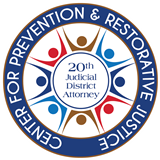
Juvenile and Adult Diversion Program
The Boulder DA’s Center for Prevention and Restorative Justice offers a variety of diversionary options that provide an alternative to prosecution for youth and adults in eligible cases. Diversion reduces the risk of future crime and decreases the negative consequences of system involvement, such as barriers to employment, housing, education, and financial aid, that can lead to worse outcomes in the future. Diversion connects participants with community services and interventions to address criminogenic risk factors and increase public safety. Restorative justice practices are used to hold participants meaningfully accountable, meet victims’ needs, repair harm from the crime, and support community reintegration. Upon successful completion of diversion requirements, the case is dismissed. District Attorney diversion programs are authorized by Colorado Revised Statutes 18-1.3-101 and 19-2.5-402.



